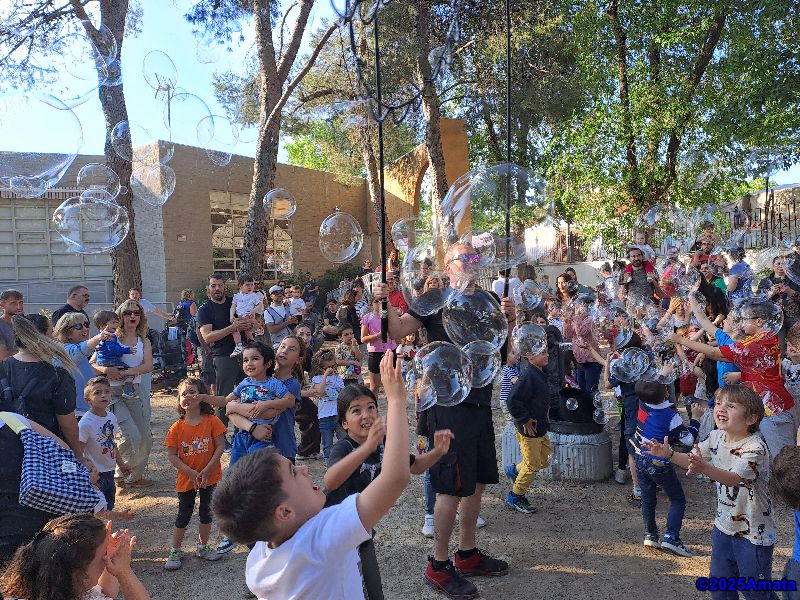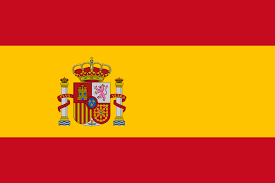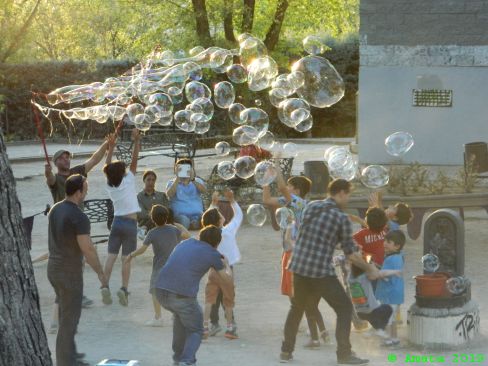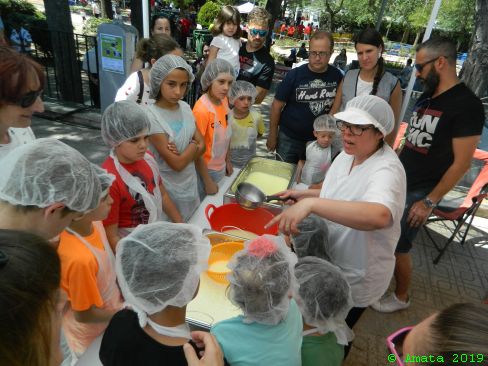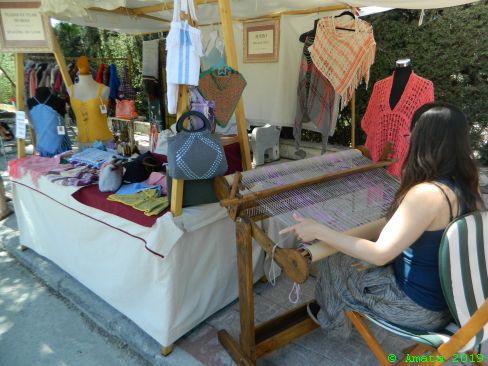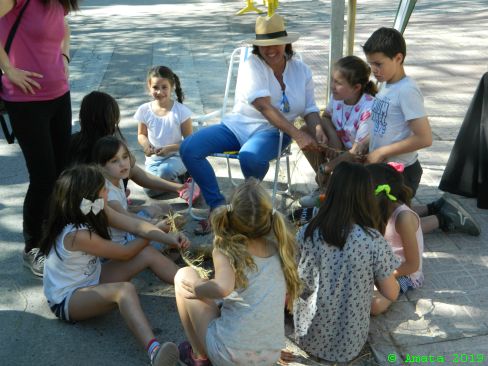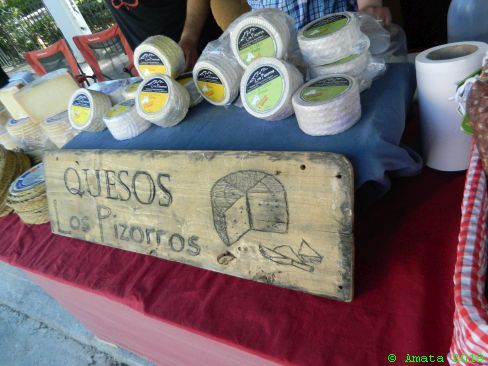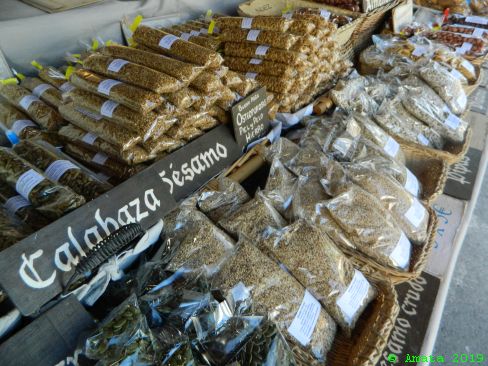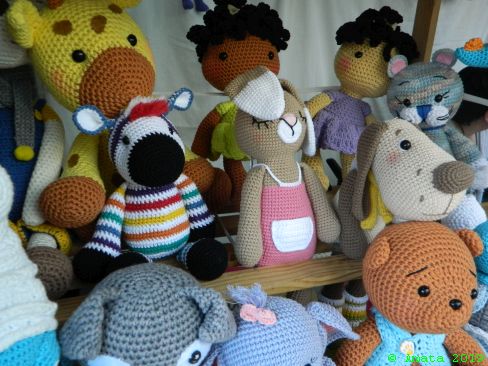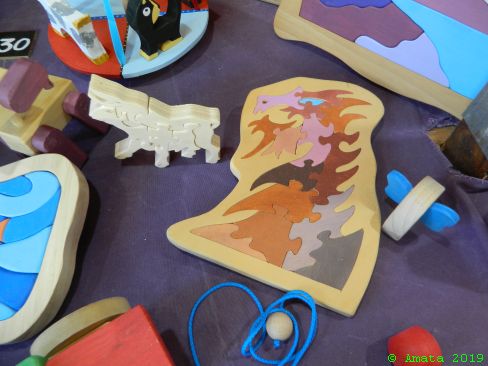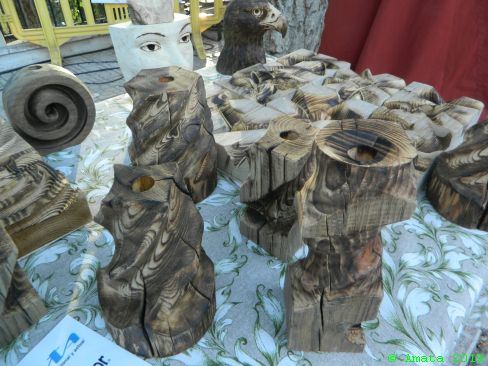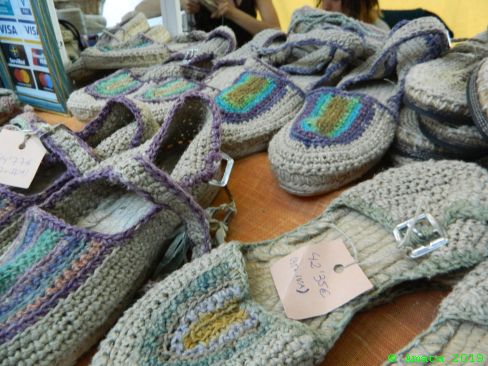
1.Who can participate in an Amata fair?
Anyone Spanish or foreign who lives and works in Spain and makes his/her material using his/her own labour plus possibly one more assistent or member of the family, whose work is of sufficient quality and who is prepared to further the general aims of Amata in a supportive and friendly manner.
Anyone Spanish or foreign who lives and works in Spain and makes his/her material using his/her own labour plus possibly one more assistent or member of the family, whose work is of sufficient quality and who is prepared to further the general aims of Amata in a supportive and friendly manner.
2.What papers do I need?
Spanish law insists that you have all requisite papers if you wish to engage in any economic activity. It's the responsibility of every individual to meet these requirements. However Amata can advise you if you are new in all this.
On the other hand, having all the right papers is not a guarantee that you will be admitted in our fairs. Amata is more interested in the quality and originality of the work, the proof of these is in photos and not in the papers.
Spanish law insists that you have all requisite papers if you wish to engage in any economic activity. It's the responsibility of every individual to meet these requirements. However Amata can advise you if you are new in all this.
On the other hand, having all the right papers is not a guarantee that you will be admitted in our fairs. Amata is more interested in the quality and originality of the work, the proof of these is in photos and not in the papers.
3.Does everything need to be handmade?
Material must be made by hand by the artisan him/herself with possibly the help of one assistent/associate/family member.
Minor and subsidiary components may be bought ready made, but must not form the mayor part of the finished article. Amata reserves the right to inspect the workshop and tools of the artisan and watch items being made. Photographs/videos of the artisan in the workshop and of articles in progress may be required if there is any doubt and such a visit is not posible.
Material must be made by hand by the artisan him/herself with possibly the help of one assistent/associate/family member.
Minor and subsidiary components may be bought ready made, but must not form the mayor part of the finished article. Amata reserves the right to inspect the workshop and tools of the artisan and watch items being made. Photographs/videos of the artisan in the workshop and of articles in progress may be required if there is any doubt and such a visit is not posible.
7.How does the selection procedure of Amata fairs work?
When a fair is confirmed, we post it on our page (“Future events”). We also send notifications and application forms to artisans who live nearby. They are notices without any form of commitment; neither the artisans are bound to participate, nor is Amata bound to admit them. In general we send two or three times the amount of invitations than there are spaces in the fair, we specify an inscription period in wich you can apply for the fair.
Any application will be answered by e-mail confirming that we have received it (NOTE: we are only confirming receiving the application, whether or not you are accepted will be confirmed in another e-mail!!)
After this period has ended, we look at all the applications we have received and we make a selection, making sure to include the widest variety possible of products and avoiding repetition of materials. In this selection we take into account the following aspects:
- originality and authenticity of the products (we prefer people with unique pieces)
- presentation of the stall
- whether or not the artisan works in his/her stall
- participation in other fairs (we make sure it's not always the same artisans who are not accepted)
- punctuality of the artisan in previous fairs
We notify everybody whether they are admitted or not.
If you are interested in a fair and you don't receive any e-mail from us, let us know as soon as possible, so we can send you the application form before the inscription period ends. From this moment onwards it may still be possible to participate if there is still space and the products don't compete with another stall.
When a fair is confirmed, we post it on our page (“Future events”). We also send notifications and application forms to artisans who live nearby. They are notices without any form of commitment; neither the artisans are bound to participate, nor is Amata bound to admit them. In general we send two or three times the amount of invitations than there are spaces in the fair, we specify an inscription period in wich you can apply for the fair.
Any application will be answered by e-mail confirming that we have received it (NOTE: we are only confirming receiving the application, whether or not you are accepted will be confirmed in another e-mail!!)
After this period has ended, we look at all the applications we have received and we make a selection, making sure to include the widest variety possible of products and avoiding repetition of materials. In this selection we take into account the following aspects:
- originality and authenticity of the products (we prefer people with unique pieces)
- presentation of the stall
- whether or not the artisan works in his/her stall
- participation in other fairs (we make sure it's not always the same artisans who are not accepted)
- punctuality of the artisan in previous fairs
We notify everybody whether they are admitted or not.
If you are interested in a fair and you don't receive any e-mail from us, let us know as soon as possible, so we can send you the application form before the inscription period ends. From this moment onwards it may still be possible to participate if there is still space and the products don't compete with another stall.
5. What kind of quality does Amata look for?
Amata prefers articles made by hand to a standard and not to a price. Amata prefers unique pieces rather tan a series of copies of one or two designs. Obviously the participants of a fair have to live, so it is quite allright to mix high quality articles that are difficult to sell with other articles that are easier to sell, as long as the latter don't take up most of the stall.
Amata prefers articles made by hand to a standard and not to a price. Amata prefers unique pieces rather tan a series of copies of one or two designs. Obviously the participants of a fair have to live, so it is quite allright to mix high quality articles that are difficult to sell with other articles that are easier to sell, as long as the latter don't take up most of the stall.
6. What about food stalls?
Depending on the wishes of the town hall Amata does admit food stalls in fairs, as well as taverns. Preference will always go to stalls that make their own products or buy them from a small artesanal company.
If you are in doubt if your product can be admitted please contact Amata.
Depending on the wishes of the town hall Amata does admit food stalls in fairs, as well as taverns. Preference will always go to stalls that make their own products or buy them from a small artesanal company.
If you are in doubt if your product can be admitted please contact Amata.
10. When to show up and how to build up
A person from Amata will be present in the fair at the time indicated in our correspondence (please read the e-mails carefully), to recive the artisans and show them their places. Amata always makes a plan with a specific space assigned for each artisan. If you have any special wishes for your space, please let us know when applying for the fair, because the day when we build up it's too late to make any changes.
There is plenty of time to build up, we ask you to respect the time frame provided by us, especially in the following:
- don´t enter the fair with your vehicle before time (if you arrive early, look for parking near the fair)
- if there is a break (for eating and resting) indicated in the time schedule, please respect this and don´t arrive 5 minutes before the break
- you have to be ready to open for the public at the time indicated
- when you arrive, park your vehicle in such a way as not to hinder anyone else. In any case, the first order of business is unloading all your things and park your car, before starting to build up your stall
- if you know you will arrive late for the build up, please call the organiser as soon as possible, so we can make any necessary adjustments
A person from Amata will be present in the fair at the time indicated in our correspondence (please read the e-mails carefully), to recive the artisans and show them their places. Amata always makes a plan with a specific space assigned for each artisan. If you have any special wishes for your space, please let us know when applying for the fair, because the day when we build up it's too late to make any changes.
There is plenty of time to build up, we ask you to respect the time frame provided by us, especially in the following:
- don´t enter the fair with your vehicle before time (if you arrive early, look for parking near the fair)
- if there is a break (for eating and resting) indicated in the time schedule, please respect this and don´t arrive 5 minutes before the break
- you have to be ready to open for the public at the time indicated
- when you arrive, park your vehicle in such a way as not to hinder anyone else. In any case, the first order of business is unloading all your things and park your car, before starting to build up your stall
- if you know you will arrive late for the build up, please call the organiser as soon as possible, so we can make any necessary adjustments
8. Is there space for me in all Amata fairs?
In Amata fairs there are between 20 and 80 stalls, depending on the available space and the expected flow of visitors. In general, the bigger the town, the more stalls there will be, so that the fair is as interesting as possible to the visitors and the artisans have the best possibility to sell their products. We take special care in assuring the best variety in products and avoiding too many similar materials or products. We neither like to have a fair where 80% of the stalls sell earrings, necklaces and bracelets.
For every fair we send more invitations tan there is space (see also question 7). For some fairs receive less aplications than there is space and for others more than there is space, depending on dates and reputation of the fair.
For certain products (above all jewelry, but also soaps, leather, crochet, etc.) there are so many artisans that they have to take turns participating in the fairs. This all being said, it is clear we cannot guarantee your participation in all the fairs you apply for. The more original your products are, the better your chances are.
In Amata fairs there are between 20 and 80 stalls, depending on the available space and the expected flow of visitors. In general, the bigger the town, the more stalls there will be, so that the fair is as interesting as possible to the visitors and the artisans have the best possibility to sell their products. We take special care in assuring the best variety in products and avoiding too many similar materials or products. We neither like to have a fair where 80% of the stalls sell earrings, necklaces and bracelets.
For every fair we send more invitations tan there is space (see also question 7). For some fairs receive less aplications than there is space and for others more than there is space, depending on dates and reputation of the fair.
For certain products (above all jewelry, but also soaps, leather, crochet, etc.) there are so many artisans that they have to take turns participating in the fairs. This all being said, it is clear we cannot guarantee your participation in all the fairs you apply for. The more original your products are, the better your chances are.
11.What are the sanctions and penalties that Amata imposes?
Amata works very hard to create a relaxed and friendly working environment in its fairs. Ocasionally problems arise or people act in a way that doesn't fit into this atmosphere. The most obvious and easy penalty Amata imposes, is not to invite you for future events. In extreme cases an artisan can be asked to pack up his/her stuff and leave.
Amata prefers people who:
1. don't have material they didn't make themselves. When we do find wholesale products you will be asked to remove them.
2. don't argue excessively with other participants or the Amata team about their space etc.
3. don't wear modern ítems such as watches, sportshoes or modern clothing in a fair with a theme.
Amata works very hard to create a relaxed and friendly working environment in its fairs. Ocasionally problems arise or people act in a way that doesn't fit into this atmosphere. The most obvious and easy penalty Amata imposes, is not to invite you for future events. In extreme cases an artisan can be asked to pack up his/her stuff and leave.
Amata prefers people who:
1. don't have material they didn't make themselves. When we do find wholesale products you will be asked to remove them.
2. don't argue excessively with other participants or the Amata team about their space etc.
3. don't wear modern ítems such as watches, sportshoes or modern clothing in a fair with a theme.
9. I wanted to come but something happened.
If something happens that doesn't allow you to participate such as an accident, sickness, storm, floods, car problems, etc. please let Amata know as soon as posible. In general there is a waiting list of people who want to participate and can fill your spot, obviously if this happens regurlaly, Amata will ask for a security deposit and won't guarantee your spot untill receiving it. If you don't show up without warning us you will be put on the "black list"
If something happens that doesn't allow you to participate such as an accident, sickness, storm, floods, car problems, etc. please let Amata know as soon as posible. In general there is a waiting list of people who want to participate and can fill your spot, obviously if this happens regurlaly, Amata will ask for a security deposit and won't guarantee your spot untill receiving it. If you don't show up without warning us you will be put on the "black list"
12. Where can I eat and sleep during the fair?
Amata usually cooks a hot meal at lunchtime, like for example a paella, salad and a drink, for only 4 €. Tickets will be sold during the market if you want to eat with Amata, this is not compulsary but just a service we offer.
Sometimes the town hall will offer a place to sleep and/or shower although you cannot count on this. We will communicate the availability in the e-mails we send with the last details. If you wish to use this space please let us know in advance to prevent an overbooking of the acommodation.
Amata usually cooks a hot meal at lunchtime, like for example a paella, salad and a drink, for only 4 €. Tickets will be sold during the market if you want to eat with Amata, this is not compulsary but just a service we offer.
Sometimes the town hall will offer a place to sleep and/or shower although you cannot count on this. We will communicate the availability in the e-mails we send with the last details. If you wish to use this space please let us know in advance to prevent an overbooking of the acommodation.
15. What about insurance?
Amata has a general third-party insurance against accidents involving the public of the fairs.
However, this insurance does not cover incidents related to cosmetics or food. This means that everybody selling food or cosmetics must have their own insurance and all paperwork in order.
Amata has a general third-party insurance against accidents involving the public of the fairs.
However, this insurance does not cover incidents related to cosmetics or food. This means that everybody selling food or cosmetics must have their own insurance and all paperwork in order.
14. What about security and safety?
Most of our events last two or three days. If the town hall does not hire security, Amata will organise artisans of the fair to do the security at night, but of course two or three security people can't watch every stall all the time. This is the reason that Amata also tries to arrange a safe building/room, where artisans can store their material overnight.
Most of our events last two or three days. If the town hall does not hire security, Amata will organise artisans of the fair to do the security at night, but of course two or three security people can't watch every stall all the time. This is the reason that Amata also tries to arrange a safe building/room, where artisans can store their material overnight.
13. How much does it cost?
Amata is interested in promoting artesanía in Spain. In general, the higher the quality, the lower the profits. Therefore, in the interest of quality, we try to keep the costs as low as possible.
In most fairs Amata charges 10% of the sales, insuring that people who don't sell much don't lose money, as they would in case of a fixed price per meter. Together with what the town hall pays, this pays for the expenses we have (entertainment, publicity, gasoil, phone calls, etc.)
When the participants have to pay something extra, the quantity will be clearly indicated in the invitations.
Amata is interested in promoting artesanía in Spain. In general, the higher the quality, the lower the profits. Therefore, in the interest of quality, we try to keep the costs as low as possible.
In most fairs Amata charges 10% of the sales, insuring that people who don't sell much don't lose money, as they would in case of a fixed price per meter. Together with what the town hall pays, this pays for the expenses we have (entertainment, publicity, gasoil, phone calls, etc.)
When the participants have to pay something extra, the quantity will be clearly indicated in the invitations.
4.Can I sell craftwork from other countries?
Amata understands perfectly that por people in Third World countries need all the help they can get, but Amata is an organisation to promote artesanía in Spain. Amata does not permit any re-sale at all, whether the material is made by friends or family of the person on the stall or is sold to help poor people abroad.
Amata understands perfectly that por people in Third World countries need all the help they can get, but Amata is an organisation to promote artesanía in Spain. Amata does not permit any re-sale at all, whether the material is made by friends or family of the person on the stall or is sold to help poor people abroad.
16. Can I work next to the stall?
Of course! Amata feels it is very important the artisans in the fair can be seen at work by the public. We even prefer that you work next to the stall and not behind it: after all we don't charge per meter!!
This has the following advantages:
1. The public can see the time and effort it takes to make things by hand and thus appreciate why handmade products are more expensive than factory made products.
2. Everybody can see that everything in any stall is handmade by the same person who is in the stall.
3. The opportunity to watch real craftsmen and women at work, makes the Amata fairs into something special, giving the public a good reason to come and see the fair.
Of course! Amata feels it is very important the artisans in the fair can be seen at work by the public. We even prefer that you work next to the stall and not behind it: after all we don't charge per meter!!
This has the following advantages:
1. The public can see the time and effort it takes to make things by hand and thus appreciate why handmade products are more expensive than factory made products.
2. Everybody can see that everything in any stall is handmade by the same person who is in the stall.
3. The opportunity to watch real craftsmen and women at work, makes the Amata fairs into something special, giving the public a good reason to come and see the fair.
click on the question to see the awnser.
1. Who can participate in an Amata fair?
2. What papers do I need?
3. Does everything need to be handmade?
4. Can I sell craftwork from other countries?
5. What kind of quality does Amata look for?
6. What about food stalls?
7. How does the selection procedure of Amata fairs work?
8. Is there space for me in all Amata fairs?
9. I wanted to participate, but someting happened, what now?
10.When do I turn up and how do I set up?
11. What are the sanctions and penalties Amata implements?
12.Where can I eat and sleep during the fair?
13.How much does it cost?
14. What about security and safety?
15.What about insurance?
16.Can I work next to my stall?
2. What papers do I need?
3. Does everything need to be handmade?
4. Can I sell craftwork from other countries?
5. What kind of quality does Amata look for?
6. What about food stalls?
7. How does the selection procedure of Amata fairs work?
8. Is there space for me in all Amata fairs?
9. I wanted to participate, but someting happened, what now?
10.When do I turn up and how do I set up?
11. What are the sanctions and penalties Amata implements?
12.Where can I eat and sleep during the fair?
13.How much does it cost?
14. What about security and safety?
15.What about insurance?
16.Can I work next to my stall?
Ferquently asked questions of craftspeople.


asociación para la mejora de la artesanía tradicional y actual
VOLVER
asociación para la mejora de la artesanía tradicional y actual
BACK
.png)
.png)
Tel: Lunes a viernes 9.00 a 13.30 h. y 17.00 a 20.00 h.
639 979 678 - Elvira
640 551 381 - Ronnie
639 979 678 - Elvira
640 551 381 - Ronnie








